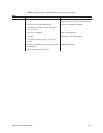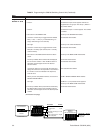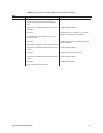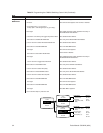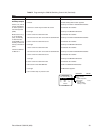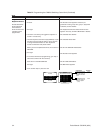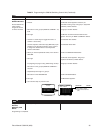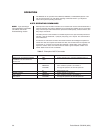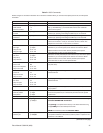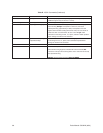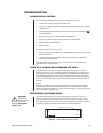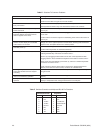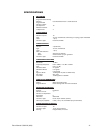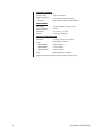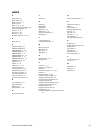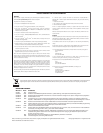
Pelco Manual C523M-H (6/05) 37
Table D. ASCII Commands
Number ranges are enclosed in brackets–do not enter the brackets. When you control a fixed speed pan and tilt, omit the speed
information.
Desired Action Command Result
Select monitor [1-9999]Ma Calls a monitor to use for camera operation.
Select camera [1-9999]#a
Next camera +a
Previous camera –a
Start a sequence [1-99]qa
forward
Start a sequence [1-99]ba
backward
Hold a sequence ea
Pan left [1-64]La
Pan right [1-64]Ra
Stop pan left sa or ~La
Stop pan right sa or ~Ra
Tilt up [1-63]Ua
Tilt down [1-63]Da
Stop tilt up sa or ~Ua
Stop tilt down sa or ~Da
Zoom telephoto Ta
Zoom wide Wa
Stop zoom telephoto sa or ~Ta
Stop zoom wide sa or ~Wa
Focus near Na
Focus far Fa
Stop focus near sa or ~Na
Stop focus far sa or ~Fa
Iris open Oa
Iris close Ca
Stop iris open sa or ~Oa
Stop iris close sa or ~Ca
Stop all PTZ motion sa
Record pattern [1-99]/a
Execute pattern [1-99]pa
End pattern [1-99]na
Go to preset position [1-99]\a
Set preset with a label la[string]!a
[1-9999]^a
Auxiliary on [1-9999]Aa
Auxiliary off [1-9999]Ba
Selects a camera to display on the current operating monitor. The NEXT
key (+) and PREV key (-) commands switch to the next numbered
camera in the system.
Starts the selected sequence going forward (incrementing camera
numbers) by pressing and holding the NEXT key for two seconds.
Starts the selected sequence going backward (decrementing camera
numbers) by pressing and holding the PREV key for two seconds.
Places the running sequence on hold, freezing the currently selected
camera on the monitor. It lets you control the camera or switch. The
sequence is still “armed” on the monitor, but inactive.
Moves the currently selected pan and tilt device left or right at the speed
indicated. If you omit the speed, some devices move at their default
speed and others move at their slowest possible speed. Speed
information has no effect on fixed speed devices.
Moves the currently selected pan and tilt device up or down at the speed
indicated. If you omit the speed, some devices move at their default
speed and others move at their slowest possible speed. Speed
information has no effect on fixed speed devices.
Makes the currently selected camera zoom in (close up view) or zoom
out (wide view).
Changes the good focus range nearer or farther on the currently
selected camera.
Opens (brighter image) or closes (darker image) the iris on the currently
selected camera.
Stops all image motion (stops pan, tilt, zoom, focus, and iris). Does not
stop a pattern.
On receivers that do patterns, these commands let you record your
motions and operations (for a limited time) and then have the system
repeat them.
Recalls a stored preset position.
Sets a preset location with an embedded label, where the ASCII string
must be UPPERCASE characters.
The [string] is an alphanumeric label up to 20 ASCII characters long
and [1-9999] is the associated preset number.
NOTE:
All transmitted characters
must be ASCII
.
Auxiliaries are relay outputs that can be controlled through the protocol.
1-8 operate auxiliaries at the camera (receiver) and 9-11 operate F1-F3
auxiliaries at the CM6700.
(Continued on next page)



